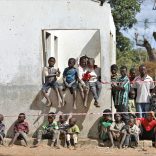Mozambique Insurgency grows at 'sensitive' time for TotalEnergies' return - AFP
Pope Francis’s visit will be an opportunity to revitalise interfaith dialogue, analysts say

File photo: Lusa
The interfaith dialogue that Pope Francis will promote during his visit to Mozambique will be a platform for strengthening acceptance and tolerance among the various faiths in the country, analysts say.
An interfaith meeting with young people is one of the items on the Pope’s visit to Mozambique from September 4th to 6th.
READ ALSO: Papal visit: Restrictions on traffic and informal trading
Mozambican businessman and former MP Amad Camal says that the Pope’s interfaith dialogue is important for reaffirm Mozambique’s reputation for conviviality and tolerance among religious.
“I am of the opinion that it never hurts to promote dialogue between different religious denominations, because the political and populist risks [of religious intolerance] are great,” Amad Camal says.
An outspoken Muslim, Amad Camal warns that Mozambique should not blithely accept assurances that the country has no religious conflict, but be alert to any possible focus of intolerance.
“It is not because there are no populists, particularly outside Mozambique, trying to create friction between the different religious denominations” that religious conflicts did not erupt, he said, but because “there is no Mozambican family without a Christian, and no Christian family without a Muslim.”
“I feel represented when Pope Francis speaks. I am a Muslim, but I feel dignified by his interventions,” Camal said.
Filipe Couto, priest and former rector of the Eduardo Mondlane University (UEM), Mozambique largest and oldest university, says that ecumenical dialogue has always been at the centre of Francisco’s concerns.
“He comes [to Mozambique], not only because of the Catholic Church and me [who am a priest] and the nuns: he comes to visit everyone,” Father Couto says.
Even countries with a state religion, when visited by Pope Francis, experience a change of mentality towards greater religious tolerance.
“He did this in the United Arab Emirates, went to visit Abu Dhabi and made a tolerance agreement between religions,” Filipe Couto notes.
Saíde Habibe, a member of the Mozambican Council of State and a Muslim leader, considers that Pope Francis has the authority to revitalise religious dialogue, because his influence transcends Catholicism.
“Interreligious dialogue does not begin today [in Mozambique], but there is a need to revitalise this dialogue,” Sheik Abibo says. And because Pope Francis transcends the purely Catholic sphere, his visit to Mozambique should touch all Mozambicans, he added.
Pope Francis arrives in Mozambique on Wednesday to start an African tour that will take him to Madagascar on the 6th of this month and to Mauritius on the 9th.
The highlights of the Pope’s visit to Mozambique are an interfaith meeting for young people in the Maxaquene sports pavilion in Maputo and a mass at the Zimpeto National Stadium, where up to 90,000 people are expected to attend, according to the organisation.
Francisco’s visit comes a month after the country’s third peace agreement was signed between the government and the main opposition party (Renamo).
Before him, Pope John Paul II visited Mozambique in 1988, preceding the first agreement that in 1992 would end the civil war.
According to the 2017 census, the Catholic faith is followed by 26% of Mozambique’s population (the largest group), Islam represents 18%, the Zion Church 15%, Evangelical / Pentecostal 14% and Anglicans about 1%.
READ ALSO: Pope’s visit to Mozambique: Cabo Delgado instability will be in the spotlight, analysts say













Leave a Reply
Be the First to Comment!
You must be logged in to post a comment.
You must be logged in to post a comment.